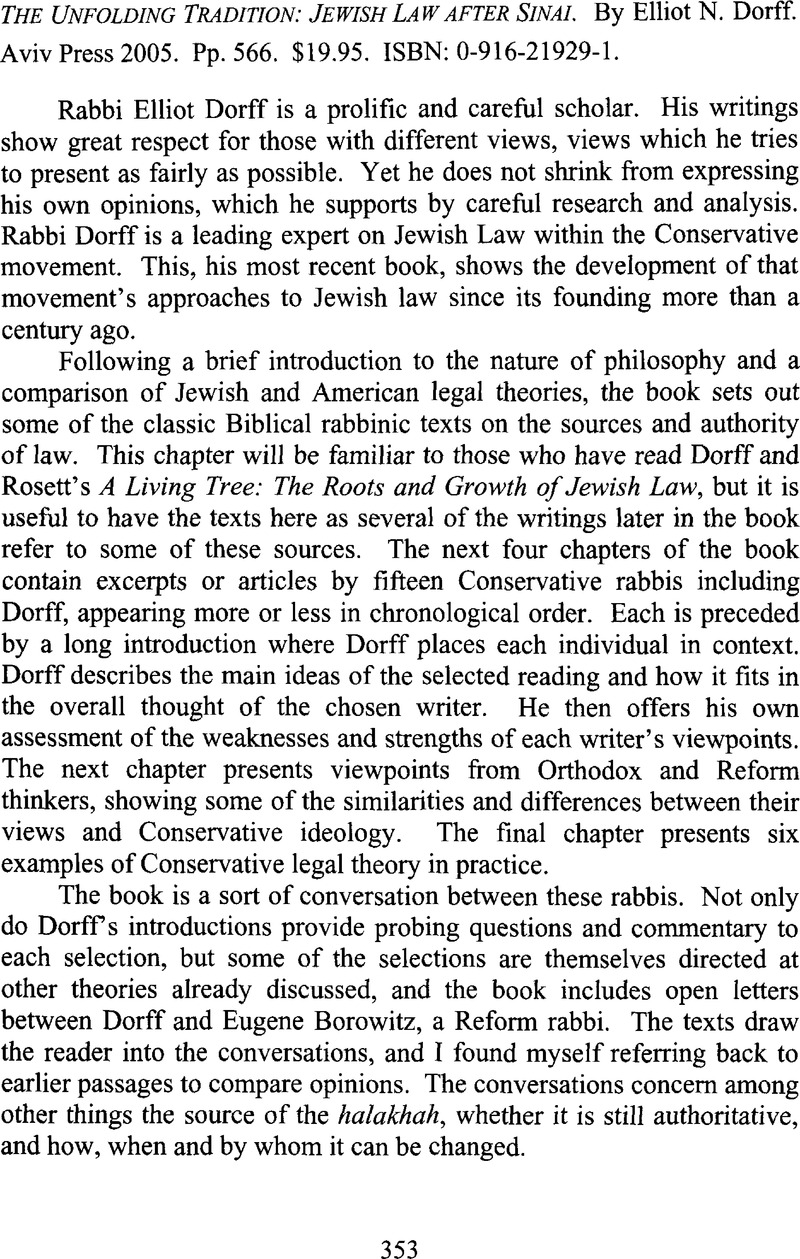No CrossRef data available.
Published online by Cambridge University Press: 24 April 2015

1. Dorff, Elliot N., Conservative Judaism: Our Ancestors to Our Descendants 116–117 (United Synagogue Am. 1977)Google Scholar.
2. As late as the early 20th century, Jewish law required compensation for medical injuries only if they were intentionally caused; if injury was caused by inadvertence, then the physician was liable only in a court of Heaven. Epstein, Rabbi Jehiel Michal, Arukh Ha-Shulhan 336:2 (1884–1907)Google Scholar. By the latter part of the century, even ultra-Orthodox rabbis imposed full liability for medical injuries caused by malpractice, deeming them to be intentional injuries. Wosner, Rabbi Shmuel Halevi, Responsa Shevet Halevi 4:151 (1981)Google Scholar; Weiss, Rabbi Isaac Jacob, Minhat Yitzhak 3:104–105 (1961)Google Scholar (injection with wrong medicine). See Friedell, Steven, Medical Malpractice in Jewish Law: Some Parallels to External Norms and Practices, 6 Chi-Kent J. Intl. & Comp. L. 1 (2006) (available at www.kentlaw.edu/jicl/spring2006.html)Google Scholar.
3. E.g. Dorff, Elliot, The Unfolding Tradition 74, 202, 209 (Aviv 2005)Google Scholar; Dorff, Elliot & Rosett, Arthur, A Living Tree, The Roots and Growth of Jewish Law 364 (SUNY 1988)Google Scholar; Dorff, Conservative Judaism, supra n. 1, at 12, 60; Cohen, Boaz, The Shulhan Aruk as a Guide for Religious Practice Today, in Conservative Judaism and Jewish Law 91 (Siegel, Seymour ed., Rabbinical Assembly 1977)Google Scholar; Dorff, Elliot, Judaism as a Religious Legal System, 29 Hastings L.J. 1331, 1356–1357 (1978)Google Scholar. But see A Living Tree, supra at 519 (noting the doctrine of the law of the kingdom is the law “was largely restricted in practice to the areas governing the relations between the government and the Jews, such as taxation and expropriation of property for governmental purposes ….”).
4. Bleich, J. David, Litigation and Arbitration Before Non-Jews, 34.3 Tradition 58 (2000)Google Scholar. However, Bleich sees no halakhic difficulty with suing in tort where the recovery is limited to the insurance coverage. Bleich, J. David, Medical Malpractice and Jewish Law, 39.1 Tradition 72, 73–74 (2005)Google ScholarPubMed.
5. E.g. Arukh, Shulhan, Hoshen Mishpat 422:1 (Hebrew)Google Scholar.
6. Dorff, Elliot N. & Spitz, Elie Kaplan, Computer Privacy and the Modern Workplace 2 (2001)Google Scholar (available at www.rabbinicalassembly.org/teshuvot/docs/19912000/dorffspitz_privacy.pdf) (responsum adopted by the Committee on Jewish Law and Standards of the Conservative movement).
7. Dorff, Elliot N., Family Violence, in Abelson, Kassel & Fine, David J., Responsa 1991-2000 The Committee on Jewish Law and Standards of the Conservative Movement 773, 775 (Rabbinical Assembly 2002)Google Scholar.
8. B. Bava Metzia 59a-b, included in The Unfolding Tradition at 27-28. An even more astounding story in the Talmud makes it appear that even in the Heavenly tribunal, God is only entitled to 50% of the voting power and must convince at least one other participant for His will to be accepted. B. Bava Metzia 86a. However, God apparently has sole power to decide who has a place in the world to come. B. Sanhedrin 104b.